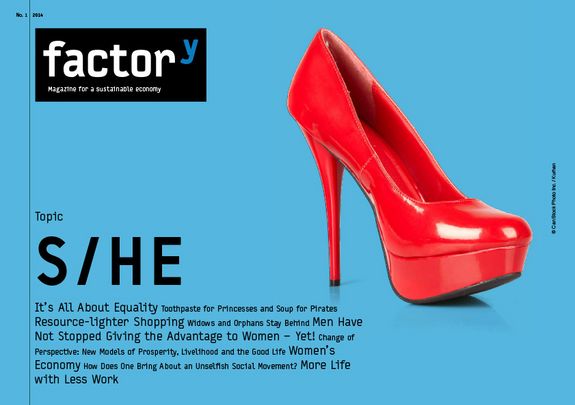Gender

The rather technically oriented field of environmental management was predominantly a men’s business. In contrast, the complex issue of sustainability requires skills that are more commonly associated with women. Therefore more and more female managers are becoming responsible for CSR and sustainability. However, as long as men do not take these issues seriously, women will continue to have few career prospects. If sustainability becomes part of the core business, this could change and women could again be ousted from their positions.
Editorial by Heike Leitschuh
Translated from the German by Chantal Gruber and Bianca Gerards
Looking around at conferences related to CSR and sustainable management, it is obvious that in companies initiating a sustainability strategy, the responsible employees are mostly young and female. The previous, usually male, generation of sustainability managers was responsible for the rather technical field of environmentalism before their tasks were extended to include sustainability. Now this seems to be changing. Consultancies specialised in sustainability and CSR employ conspicuous numbers of women, as do sustainability research groups in companies such as Oekom Research AG. Of the 30 analysts working here, two thirds are female and all new employees in April 2014 were also women.
Women evidently show a high affinity for the issues of sustainable business. The reason for this phenomenon is not yet clear due to the fact that there are no reliable figures or related research. Here are some thoughts on the matter:
The competence profile of sustainability managers…
Sustainability managers need a number of very different competences to be successful. They move ‘between worlds’ in almost every department of the company, since these usually present distinct cultures and ways of thinking and acting. The aim is to establish and implement common sustainability strategies. However, sustainability managers have an impact externally and need to foster contacts to stakeholders. This ‘sandwich position’ between high external expectations and the realistic opportunities within the company is not always convenient. Sustainability managers are most successful when they have or can develop the following abilities:
- To manage complexity, in other words pull many strings and develop a consistent strategy;
- To have empathy for the different constellations of labour conditions, performance requirements and interests of a company thus compile the respective links for the aims of sustainability;
- To have good internal and external communication and cooperation for which empathy, that is the ability to put oneself in somebody’s position, is an important although insufficient requirement.
However, the details of sustainability targets can arouse opposition due to conflicting interests in the company. Hence, sustainability managers should be persistent, willing to take risks and certainly not avoid conflict.
… especially suits female strengths
Besides the required professional competences concerning how the company does in its core business and besides a certain capacity for enthusiasm and persuasiveness, these are the key properties that apply to sustainability managers. It seems as if quite a few of these, with the exception of the ability to handle conflicts, correspond well to female strengths.
However, this may not be the main reason why an increased number of women are working in the field of CSR and sustainability. If you ask female managers, they come up with another explanation, as does the female manager responsible for CSR in a larger mid-sized enterprise in Bavaria: it is – still – not possible to have a distinguished career in a company in CSR or sustainability, and this is why men have not stopped giving the advantage to women in these fields. This is the unflattering statement. “Men still do not take this issue particularly seriously”, she says. This is particularly true for companies where the management floor does not authentically back this issue but rather work on sustainability, whether they like it or not, because it is demanded by politics, the public, clients or the financial market.
However, in companies whose sustainability strategy is actually geared to their core business or who have recognised that sustainability is a question of survival, men dominate the field as in several automobile enterprises and power companies.
The other view
Can women actually make a specific contribution to sustainable management? I believe they can, namely in at least two respects. First of all, women usually have a more holistic view of things. This is extremely helpful as sustainability strategies are very complex and rich in dilemmas. Secondly, women are often less interested in technology than men are. Consequently, they will not primarily seek technical solutions to every problem because the basic questions of sustainability cannot be solved with technology. Rebound effects will consume any efficiency gains if we do not respond to the challenge of sufficiency. The question ‘How much is enough?’ is one that requires a social and cultural dialogue. This dialogue does not spare companies.
Hence, companies that are serious about sustainability should also look for good female executives.
Heike Leitschuh is a publicist, book author, presenter and advisor for sustainable development in Frankfurt am Main. Her topics are sustainable development, stakeholder dialogues, lifestyle and the post-growth society. She is also a co-publisher of the Jahrbuch Ökologie (ecology yearbook).
More articles on the topics of gender relations and sustainability you will find not only online but in our magazine S/He to download. The PDF-magazine is finely illustrated and good readable on tablets and screens and it contains all articles and pictures including numbers and quotations on topic.
Beiträge online
GENDER

- It is about equality
- Toothpaste for Princesses and Soup for Pirates
- Men Have Not Stopped Giving the Advantage to Women – So Far
- Resource-light shopping
- Perspektivenwechsel: Neue Wohlstandsmodelle, Livelihood und Gutes Leben
Themen
- The Domino Effect: the Mobility Transition as an Engine for the ‘Great Transformation’
- Cities Use the Space
- Decarbonization by 2030
- The fear of biting the hand that feeds you
- Where investing is a pleasure
- Why divestment is going to change the world
- A Robin Hood tax for climate protection
- May the Force Be with Us
- Modern Strategies
- The prerogative of interpreting the future now lies with the companies involved in climate protection”
- From Negotiating to Trading Equitably
- Can a donkey be tragic?
- Rethink rather than rebound: a sufficiency revolution must precede the efficiency revolution
- On Rebound, Prebound and Performance Gaps
- So Let Us Seize Power Then!
- With Common Property Against Political Failure
- So Let Us Seize Power Then!
- The Comforting Beauty of Failure
- “It Is Not Impossible at All.“
- Resource-light shopping
- Men Have Not Stopped Giving the Advantage to Women – So Far
- Toothpaste for Princesses and Soup for Pirates
- It is about equality
- A nice day
- Initiative instead of frustration
- The right ingredients
- Resilient for Life
- Not only, but also
- Appreciation – more please!
- Worth more than money
- Learning to value the value of goods
- Worth and Values
- The Transformative Power of Science
- Historically effective: How innovation and technology transform
- The Disappearance of Products
- Growing Older 101
- Columbus’ Egg
- It Works! In Theory at Least ...
- What If...?
- Analysing Separately – Thinking and Acting Together!
- Let’s Break Away from Determined Breaking Points
- More Gold in Waste than in Mines
- The art of separation
- Should you really DIY?
- The Aesthetics of Do-It-Yourself
- Standing on One’s Own Feet
- From the handaxe to desktop fabrication
- Using Shares to Survive the Crisis
- When Citizens participate
- Possess to Participate
- The Right Growth at the Right Time
- Gunter Pauli and Blue Economy
- When Sustainability Grows
- How we treat Growth
- Illusions about Growth

